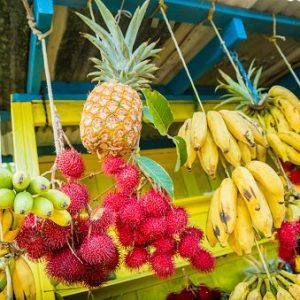In this series, we are taking a closer look at elements in the Hawaiian food systems including innovations and issues. Hawaiian agriculture is unique to the islands and showcases a host of special challenges.
Read on for Carly Wyman’s experience with Hawaiian agriculture. She is the Swette Center’s on-the-ground team member researching Hawai’i’s food, agriculture, and policy. In this series, Carly shares her insights on the unique challenges in the Hawaiian food systems.
One barrier to increased food security in the islands has to do with a lack of adequate food processing infrastructure. Earlier this year, a small group of passionate food system advocates, including myself, acquired some very useful equipment to help address this issue. An industrial-scale fruit juicing system became available from a local farm that was no longer using it, and we jumped at the opportunity to acquire this equipment to put back into use.
After graduating with an M.S. from the Swette Center for Sustainable Food Systems in the summer of 2021, I came on board as a staff member to contribute to the growing body of research at the center. My research for the center has focused on the feasibility of increasing Hawai'i’s food processing capacity utilizing this legacy equipment. The research has included conversations with farmers, businesspeople, and commercial buyers to help to understand what it would take to re-establish a local juicing business to take advantage of Hawai'i’s tropical fruit production. It has been striking to learn about the challenges of establishing such a business, including high start-up and operational costs and lack of adequate supply of individual fruits to justify equipment of this scale. However, there is great interest from fruit producers as well as potential buyers of product to see a business of this type take shape. As our plans for the equipment continue to unfold, we will be seeking to utilize the equipment in a way that meaningfully supports local producers and consumers.
